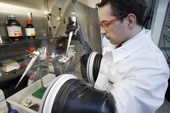Financial sponsorship running into millions has opened the way for the development of new generations of high energy batteries for use in plug-in hybrid automobiles and the electric powered vehicles of the future. Under the guidance of BASF Future Business GmbH, eighteen partners from industry and science have combined into the cross-sector consortium “HE-Lion” to develop and bring to market efficient, higher-performing and safer lithium ion batteries over the next four to six years.

The German Ministry of Education and Research (BMBF) is funding the HE-Lion project with €21 million as part of the “Lithium Ion Battery LIB 2015” alliance for innovation. The partners in the consortium will be contributing the same amount directly from their own financial resources.
“This alliance is an essential contribution to strengthening Germany as a heartland of innovation. In research, we must make the decisive breakthrough with new battery materials as soon as possible. Only then can we make electromobility affordable and free it from its niche existence,” emphasizes Dr. Andreas Kreimeyer, Member of the Board of Executive Directors of BASF and Research Executive Director.
The BMBF initiative LIB 2015 with a total sponsorship volume of €60 million for several consortia aims to bring to market by 2015 higher performing, safer and above all affordable lithium ion batteries for future propulsion systems such as plug-in hybrid automobiles. A plug-in hybrid is a powered vehicle with a hybrid propulsion system with a battery that can also be charged externally from the mains supply. Equipped with an internal combustion engine, electrical drive system and a battery, it can be driven both with gasoline and electricity.
With companies of the chemical industry, battery industry, the automotive and energy sector and numerous partners from universities and institutes, HE-Lion is the largest consortium in LIB 2015. As energy stores of the future, lithium ion batteries are a key technology for a climate friendly energy supply. For BASF, climate protection is a long-term strategic issue to which its commitment in this project is also contributing.
While the existing first and second generation of lithium ion batteries are already being used in laptops, smartphones or cameras, a newer and more stable system has to be developed for the third and fourth generations. Key factors for the success of the new batteries are high safety, high effectiveness and an affordable price. The aim is to achieve two to five times more energy density compared to previous battery systems. This will ensure that plug-in hybrids and electrically powered vehicles can reach acceptable driving ranges. Based on existing series production models, in future they should only need to recharge after 200 kilometers instead of 50 km at present.
This will mean having to improve mainly the cathode of the battery. BASF experts are developing a portfolio of innovative cathode materials, special metal oxides, that are produced by high-temperature synthesis. These activities include the conceptual design of the materials, laboratory synthesis and scale-up, i.e. transfer to the production scale. At present the materials still account for more than 50 percent of the cost of lithium ion batteries.
“With representatives of all technological disciplines, we now have the opportunity to reinvent the battery in the truest sense of the word. With a globally competitive technology, our partners will be positioning themselves as leading worldwide suppliers of materials, components, cells and batteries,” says Dr. Thomas Weber, Managing Director of BASF Future Business GmbH. Until the innovative battery can be tested in a VW Golf in a few years from now, however, the inventors will have to carry out more than 10,000 different tests. By today's standards, a lithium ion battery for a Golf would be as expensive as the vehicle itself. Modern production processes are needed to assure high quality and environmentally friendly manufacture and to significantly reduce costs. To achieve these goals, materials research experts are needed as much as system developers.
The industrial consortium covers a broad range of activities extending from material research to system integration. BASF, Freudenberg Vliesstoffe and SGL Carbon are responsible for material manufacture. Prototype development and cell technology are provided by Fraunhofer Institute Itzehoe and the companies Gaia, Leclanché and Bosch. Implementation in the vehicle is being undertaken by Volkswagen, and the EnBW energy company will develop models for integrating the high-energy batteries into a new power supply concept for load balancing. In fundamental research, cooperative projects are ongoing with the universities of Berlin, Bonn, Clausthal, Darmstadt, Giessen, Hannover, Münster, the Paul-Scherrer Institute in Switzerland and the Leibniz Institute of Dresden. The consortium partners see their competitive advantage in the unique constellation of this venture.